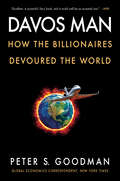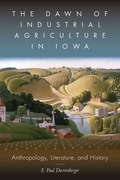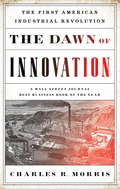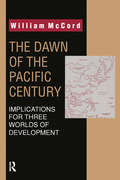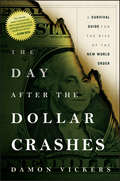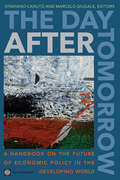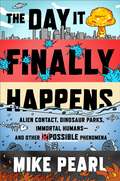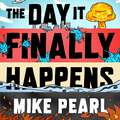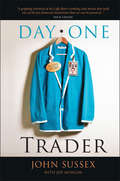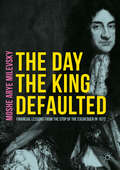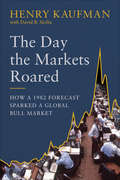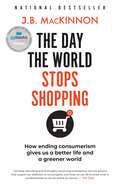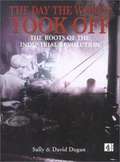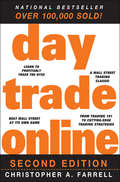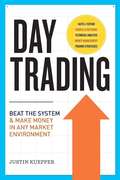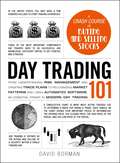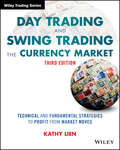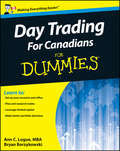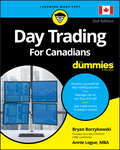- Table View
- List View
Davos Man: How the Billionaires Devoured the World
by Peter S. GoodmanFrom the New York Times’s Global Economics Correspondent, a masterwork of explanatory journalism that exposes how billionaires’ systematic plunder of the world—brazenly accelerated during the pandemic—has transformed 21st-century life and dangerously destabilized democracy. "Davos Man will be read a hundred years from now as a warning. ... Deliciously rich with searing detail, the clarity is reminiscent of Tom Wolfe." —EVAN OSNOSThe history of the last half century in America, Europe, and other major economies is in large part the story of wealth flowing upward. The most affluent people emerged from capitalism's triumph in the Cold War to loot the peace, depriving governments of the resources needed to serve their people, and leaving them tragically unprepared for the worst pandemic in a century.Drawing on decades of experience covering the global economy, award-winning journalist Peter S. Goodman profiles five representative "Davos Men"–members of the billionaire class–chronicling how their shocking exploitation of the global pandemic has hastened a fifty-year trend of wealth centralization. Alongside this reporting, Goodman delivers textured portraits of those caught in Davos Man’s wake, including a former steelworker in the American Midwest, a Bangladeshi migrant in Qatar, a Seattle doctor on the front lines of the fight against COVID, blue-collar workers in the tenements of Buenos Aires, an African immigrant in Sweden, a textile manufacturer in Italy, an Amazon warehouse employee in New York City, and more.Goodman’s rollicking and revelatory exposé of the global billionaire class reveals their hidden impact on nearly every aspect of modern society: widening wealth inequality, the rise of anti-democratic nationalism, the shrinking opportunity to earn a livable wage, the vulnerabilities of our health-care systems, access to affordable housing, unequal taxation, and even the quality of the shirt on your back. Meticulously reported yet compulsively readable, Davos Man is an essential read for anyone concerned about economic justice, the capacity of societies to grapple with their greatest challenges, and the sanctity of representative government.
The Dawn of Industrial Agriculture in Iowa: Anthropology, Literature, and History
by E. Paul DurrenbergerIn The Dawn of Industrial Agriculture in Iowa E. Paul Durrenberger recounts the transformation of Iowa’s family farms into today’s agricultural industry through the lens of the lives and writings of Iowa novelist Paul Corey and poet Ruth Lechlitner. This anthropological biography analyzes Corey’s fiction, Lechlitner’s poetry, and their professional and personal correspondence to offer a new perspective on an era (1925–1947) that saw the collapse and remaking of capitalism in the United States, the rise of communism in the Soviet Union, the rise and defeat of fascism around the world, and the creation of a continuous warfare state in America. Durrenberger tells the story that Corey aimed to record and preserve of the industrialization of Iowa’s agriculture and the death of its family farms. He analyzes Corey’s regionalist focus on Iowa farming and regionalism’s contemporaneous association in Europe with rising fascism. He explores Corey’s adoption of naturalism, evident in his resistance to heroes and villains, to plot structure and resolution, and to moral judgment, as well as his ethnographic tendency to focus on groups rather than individuals. An unusual and wide-ranging study, The Dawn of Industrial Agriculture in Iowa offers important insight into the relationships among fiction, individual lives, and anthropological practice, as well as into a pivotal period in American history.
The Dawn of Innovation: The First American Industrial Revolution
by Charles R. MorrisIn the thirty years after the Civil War, the United States blew by Great Britain to become the greatest economic power in world history. That is a well-known period in history, when titans like Andrew Carnegie, John D. Rockefeller, and J. P. Morgan walked the earth. But as Charles R. Morris shows us, the platform for that spectacular growth spurt was built in the first half of the century. By the 1820s, America was already the world's most productive manufacturer, and the most intensely commercialized society in history. The War of 1812 jumpstarted the great New England cotton mills, the iron centers in Connecticut and Pennsylvania, and the forges around the Great Lakes. In the decade after the War, the Midwest was opened by entrepreneurs. In this beautifully illustrated book, Morris paints a vivid panorama of a new nation buzzing with the work of creation. He also points out the parallels and differences in the nineteenth century American/British standoff and that between China and America today.
Dawn of the E-Lance Economy
by Thomas W. Malone Robert J. LaubacherIn this eye-opening article, Thomas W. Malone and Robert J. Laubacher of the Massachusetts Institute of Technology look at how a new kind of organization could form the basis of a new kind of economy--an e-lance economy--where all the old rules of business are overturned and big companies are rendered obsolete. Drawing on their research at MIT's Initiative on Inventing the Organizations of the 21st Century, the authors postulate a world in which business is not controlled through a stable chain of management in a large, permanent company. Rather, it is carried out autonomously by independent contractors connected through personal computers and electronic networks. These electronically connected freelancers--e-lancers--would join together into fluid and temporary networks to produce and sell goods and services. When the job is done--after a day, a month, a year--the network would dissolve and its members would again become independent agents. Far from being a wild hypothesis, the e-lance economy is, in many ways, already upon us. We see it in the rise of outsourcing and telecommuting, in the increasing importance within corporations of ad-hoc project teams, and in the evolution of the Internet. Most of the necessary building blocks of this type of business organization--efficient networks, data interchange standards, groupware, electronic currency, venture capital micromarkets--are either in place or under development. What is lagging behind is our imagination. But, the authors contend, it is important to consider sooner rather than later the profound implications of how such an e-lance economy might work. They examine the opportunities, and the problems, that may arise and anticipate how the role of managers may change fundamentally--or possibly even disappear altogether.
The Dawn of the Pacific Century: Implications For Three Worlds Of Development
by William McCordThis book is a bold affirmation of the Asian 'miracle' of development, an explanation of reasons for its success, and a review of its implications. As McCord reminds us, understanding why and how these nations have propelled themselves so far, so fast, is a key to anticipating the destiny of much of the rest of the world. Despite their interest, analysis have been confounded in attempts to explain Asian Development-without resources and colonies, without internal violence, and broadly distributing wealth as they have grown. Existing theories of development offer little guidance. Even explanations that look to the special circumstances of Asian countries have their weaknesses. Reviewing all of these explanations, McCord identifies a common group of socioeconomic values and policies shared by most of these nations. And these, he shows, tell us much. The Dawn of the Pacific Century convincingly makes the case for a genuinely Asian model of development-one that must be understood on its own terms. It should find a broad professional social science readership. In addition, those general readers who wish to learn from and understand the Asian challenge will find this book a good beginning.
DAX Cookbook: Over 120 recipes to enhance your business with analytics, reporting, and business intelligence
by Greg DecklerBusiness users, BI developers, data analysts, and SQL users who are looking for solutions to the challenges faced while solving analytical operations using DAX techniques and patterns will find this book useful. Basic knowledge of the DAX language and Microsoft services is mandatory.
The Day After the Dollar Crashes: A Survival Guide for the Rise of the New World Order
by Damon VickersHow to profit from the events leading up to the likely collapse of the U.S. dollar Society is at a crossroads. Here at home and around the world, we are living in a manner that is absolutely, unconditionally, irrevocably unsustainable. The Day After the Dollar Crashes: A Survival Guide for the Rise of the New World Order outlines the kinds of events that could trigger a global economic collapse, describing in detail the events that are likely to occur just prior to, during, and immediately following such a total collapse. It also explains how investors can profit and support a sustainable future by anticipating social trends. Describes what government can do now to soften the dollar's fall later Details how to lead the charge to introduce innovations and solutions to meet the inevitable challenges of new kinds of economic forces Reveals how to profit by changing expectations and taking action to align investments with reality The Day After the Dollar Crashes tears away the illusions generated by politicians, media, and the financial industry to show how investors can position themselves to survive and thrive in a New World Order.
The Day After Tomorrow: A Handbook on the Future of Economic Policy in the Developing World
by Marcelo M. Giugale Otaviano CanutoThe 2008-09 Global Financial Crisis shook the ground under the conventional wisdom that had guided mainstream development economics. Much of what had been held as true for decades is now open to reexamination-from what the role of governments should be in markets to which countries will be the engines of the world's economy, from what people need to leave poverty to what businesses need to stay competitive. Development economists look into the future. They do not just ask how things work today, but how a new policy, program, or project would make them work tomorrow. They view the world and history as a learning process-past and present are inputs into thinking about what is coming. It is that appetite for a vision of the future that led the authors of 'The Day after Tomorrow: A Handbook on the Future of Economic Policy in the Developing World' to invite some 40 development economists, most of them from the World Bank's Poverty Reduction and Economic Management Network-an epicenter of the profession-to report what they see on the horizon of their technical disciplines and of their geographic areas of specialization. The disconcerting but exciting search for a new intellectual compact has begun. To help guide the discussion, 'The Day after Tomorrow: A Handbook on the Future of Economic Policy in the Developing World' puts forth four key messages: While the developed world gets its house in order, and macroeconomics and finance achieve a new consensus, developing countries will become a (perhaps the) growth engine for the world. Faster technological learning and more South-South integration will fuel that engine. Governments in developing countries will be better-they may even begin to earn the trust of their people. A new, smarter generation of social policy will bring the end of poverty within reach, but the attainment of equality is another matter. Many regions of the developing world will break out of their "developing" status and will graduate into something akin to "newly developed." Africa will eventually join that group. Others, like Eastern Europe, have a legacy of problems to address before such a transition. While some regions will do better than others, and some technical areas will be clearer than others, there is no question that the horizon of economic policy for developing countries is promising-risky, yes, but promising. The rebalancing of global growth toward, at the very least, a multiplicity of engines, will give the developing world a new relevance.
A Day in Prison: An Insider's Guide to Life Behind Bars
by John Fuller Holly LorinczTwenty-four hours is a lot of time in prison, and here is a moment to moment guide of how each one goes by.A Day in Prison shows what life is like for prisoners from morning roll call to lights out. It tracks the many ins and outs of prison culture and provides a comprehensive look into the dynamics that define inmates’ daily interactions with each other, prison guards, and prison administrators. It gives a full sense of the challenges?small and large?presented to inmates as they try to survive each day.The book is structured like an actual day in prison, hour by hour, tracking where in the prison a prisoner would most likely be and what they would most likely be doing. It brings a clear sense of the unique environment that is a prison and makes sense of it for the reader, step-by-step. Based in the author’s own experience, being incarcerated for eleven years, it is as realistic a guide to life in prison as any reader could have.
A Day in the Life of Alex Sander: Driving in the Fast Lane at Landon Care Products
by Larry E. Greiner Elizabeth CollinsAlex Sander is a new product manager whose drive and talents are attractive to management, but whose intolerant style has alienated employees. This tension is presented against the backdrop of a 360 performance review process. Sander works in the Toiletries Division of Landon Care Products, which has recently been acquired by a European beauty company. Sander is leading the launch of a European skin care product into the U.S. market, which requires working with a multinational product development team. Sander's interactions with peers and direct reports in the case paint a picture of a tough, inflexible high achiever who uses temper as a management tool. At the end of the day, Sander's supervisor Sam Glass will provide Sander with 360 performance feedback-the first time this process has been used at Landon. Sander remains skeptical about the value of the process and feedback, and of a long-term fit with the organization. On the other hand, Glass has a very high personal interest in keeping Sander at the company, but wonders how the organization can best develop and manage this star performer.
A Day in the Life of Alex Sander: Driving in the Fast Lane at Landon Care Products
by Elizabeth Collins Larry E. GreinerAlex Sander is a new product manager whose drive and talents are attractive to management, but whose intolerant style has alienated employees. This tension is presented against the backdrop of a 360 performance review process. Sander works in the Toiletries Division of Landon Care Products, which has recently been acquired by a European beauty company. Sander is leading the launch of a European skin care product into the U.S. market, which requires working with a multinational product development team. Sander's interactions with peers and direct reports in the case paint a picture of a tough, inflexible high achiever who uses temper as a management tool. At the end of the day, Sander's supervisor Sam Glass will provide Sander with 360 performance feedback-the first time this process has been used at Landon. Sander remains skeptical about the value of the process and feedback, and of a long-term fit with the organization. On the other hand, Glass has a very high personal interest in keeping Sander at the company, but wonders how the organization can best develop and manage this star performer.
The Day It Finally Happens: Alien Contact, Dinosaur Parks, Immortal Humans - And Other Possible Phenomena
by Mike Pearl__________If you live on planet Earth, you're probably scared about the future.Terrorism, complicated international relations, global warming, killer viruses and a raft of other issues make it hard not to be.Watching the news you have to wonder: is it safe to go out there or not?In The Day It Finally Happens, Mike Pearl games out many of the 'could it really happen?' scenarios we've all speculated about, assigning a probability rating, and taking us through how it would unfold. He explores what would likely occur in dozens of possible scenarios - the final failure of antibiotics, the loss of the world's marine life, the abolition of the British monarchy, and even the arrival of aliens - and reports back from the future, providing a clear picture on how the world would look, feel, and even smell in each of these instances.Hilarious, enlightening, and terrifying, this book makes science accessible and is a unique form of existential therapy, offering practical answers to some of our most worrisome questions.Thankfully, the odds of humanity pulling through look pretty good.__________For fans of such bestsellers as What If?,The Worst Case Scenario Survival Handbook and The Uninhabitable Earth, as well as Steven Pinker and Malcolm Gladwell, this is a book about future events that we don't really understand and getting to know them in close detail.Entertaining speculation featuring both authoritative research and a bit of mischief: a look at how humanity is likely to weather such happenings as the day nuclear war occurs, the day the global internet goes down, the day we run out of effective antibiotics, and the day immortality is achieved.
The Day It Finally Happens: Alien Contact, Dinosaur Parks, Immortal Humans - And Other Possible Phenomena
by Mike Pearl__________If you live on planet Earth, you're probably scared about the future. Terrorism, complicated international relations, global warming, and a raft of other issues make it hard not to be. Watching the news you have to wonder: is it safe to go out there or not? In The Day It Finally Happens, Mike Pearl games out many of the 'could it really happen?' scenarios we've all speculated about, assigning a probability rating, and taking us through how it would unfold. He explores what would likely occur in dozens of possible scenarios - the final failure of antibiotics, the loss of the world's marine life, the abolition of the British monarchy, and even the arrival of aliens - and reports back from the future, providing a clear picture on how the world would look, feel, and even smell in each of these instances. Hilarious, enlightening, and terrifying, this book makes science accessible and is a unique form of existential therapy, offering practical answers to some of our most worrisome questions. Thankfully, the odds of humanity pulling through look pretty good. __________For fans of such bestsellers as What If?,The Worst Case Scenario Survival Handbook and The Uninhabitable Earth, as well as Steven Pinker and Malcolm Gladwell, this is a book about future events that we don't really understand and getting to know them in close detail. Entertaining speculation featuring both authoritative research and a bit of mischief: a look at how humanity is likely to weather such happenings as the day nuclear war occurs, the day the global internet goes down, the day we run out of effective antibiotics, and the day immortality is achieved.(P) 2019 Simon & Schuster Audio
Day One Trader
by Joe Morgan John Sussex"The catastrophic events of 2008 prove that the financial world has not learnt the lessons of my own tragic tale. But anyone who thinks that the world of derivatives is just about greedy bankers who put our pensions and savings at risk is wrong. Day One Trader is the gripping chronicle ofthe unknown working heroes of the Liffe floor who shattered a glass ceiling of elitism in the City of London and helped build one of the few financial institutions that we can be proud of."--Nick Leeson"As I walked into the members entrance of the exchange for the first time on September 30 1982 I felt a buzz of excitement. I had realised my ambition of being a "day-one trader". Inside, the fluorescent lit exchange floor bustled with about three hundred traders in orange, red and blue jackets. A brief opening ceremony was overseen by Gordon Richardson, the governor of the Bank of England, before he cut a white ribbon hanging above a pulpit overlooking the floor. I felt at fever pitch as we counted down the start of trading. "Ten, nine, eight, seven, six, five, four, three, two, one!" The bell rang and I watched a scrum of dealers scramble to trade Liffe's first ever contracts in a heap of frenetic energy."--From Day One TraderDay One Trader is the exclusive story of John Sussex on his journey from son of a Basildon factory worker, leaving school at 16, to successful City financier and member of the Liffe board.Providing a unique insight to this competitive and often brutal industry, readers will discover the tactics used by dealers to survive the jungle of the pits in a story that chronicles the floor banter and characters that made Liffe a global derivatives powerhouse.Packed full of exclusive - until now unreported - stories, Day One Trader sheds new light on what motivated characters such as Nick Leeson, and provides insight to Liffe floors star traders.Financial experts and novices alike will be gripped by Sussex's account of the highs and lows of a career that spanned almost three decades in the history of the financial markets."John Sussex lived by the mantra of My Word is My Bond. This makes Day One Trader a must read for all traders. Every page brings back a lifetime of trading memories of days that will never be the same."--David Barnett, Global Head of Treasury, Royal Bank of Canada"Day One Trader describes a journey through a world that came and went in too short a time. The Liffe floor challenged the status quo in the City of London in the early eighties and was itself killed off by technology in the late nineties. John Sussex was one of the great characters of that world and a man of the utmost integrity."--Richard Berliand J.P. Morgan, Chairman Futures & Options
Day Spa & More
by Entrepreneur MagazineAre you ready to take the plunge and start your own spa? Now's the perfect time. Spas have become one of the fastest-growing industries around the globe. Whether you're interested in day spas, medical spas, spiritual spas, yoga centers or another variety, the expert advice in this guide helps you get started today.Learn all the business information you need to succeed--from choosing a location to setting prices to attracting new clients.Plus, get the hottest trends in the spa industry and expert advice on the creative elements that turn an ordinary spa into an extraordinary relaxation center.Researching the marketIdentifying a niche and attracting a target audienceCreating the right atmosphere to enhance the spa experienceOffering the hottest spa servicesHiring talented and trustworthy employees25 marketing tactics under $50And more!Pick up this guide to get started and succeed in this fun , profitable, and rewarding business.The First Three YearsIn addition to industry specific information, you'll also tap into Entrepreneur's more than 30 years of small business expertise via the 2nd section of the guide - Start Your Own Business. SYOB offers critical startup essentials and a current, comprehensive view of what it takes to survive the crucial first three years, giving your exactly what you need to survive and succeed. Plus, you'll get advice and insight from experts and practicing entrepreneurs, all offering common-sense approaches and solutions to a wide range of challenges. Pin point your target market Uncover creative financing for startup and growth Use online resources to streamline your business plan Learn the secrets of successful marketing Discover digital and social media tools and how to use them Take advantage of hundreds of resources Receive vital forms, worksheets and checklists From startup to retirement, millions of entrepreneurs and small business owners have trusted Entrepreneur to point them in the right direction. We'll teach you the secrets of the winners, and give you exactly what you need to lay the groundwork for success.BONUS: Entrepreneur's Startup Resource Kit!Every small business is unique. Therefore, it's essential to have tools that are customizable depending on your business's needs. That's why with Entrepreneur is also offering you access to our Startup Resource Kit. Get instant access to thousands of business letters, sales letters, sample documents and more - all at your fingertips!You'll find the following:The Small Business Legal ToolkitWhen your business dreams go from idea to reality, you're suddenly faced with laws and regulations governing nearly every move you make. Learn how to stay in compliance and protect your business from legal action. In this essential toolkit, you'll get answers to the "how do I get started?" questions every business owner faces along with a thorough understanding of the legal and tax requirements of your business.Sample Business Letters1000+ customizable business letters covering each type of written business communication you're likelyto encounter as you communicate with customers, suppliers, employees, and others. Plus a complete guide to business communication that covers every question you may have about developing your own business communication style.Sample Sales LettersThe experts at Entrepreneur have compliled more than 1000 of the most effective sales letters covering introductions, prospecting, setting up appointments, cover letters, proposal letters, the all-important follow-up letter and letters covering all aspects of sales operations to help you make the sale, generate new customers and huge profits.
The Day the King Defaulted: Financial Lessons from the Stop of the Exchequer in 1672
by Moshe Arye MilevskyThis book studies King Charles II's decision to stop all payments from his royal exchequer, a sordid but little-known event in English history with eerie similarities to the cause of the Great Recession of 2008. As with any modern banking crisis, the financial system in 1672 almost collapsed, day-to-day commerce ground to a halt, houses were lost, and ordinary investors suffered—but there was no banking bailout, and no mercy for the goldsmith-bankers who had lent the king millions to fund his unsustainable lifestyle. The royal decision, made in the wake of plagues, fires, and war with the Dutch, left bankers unable to cover their own liabilities and, in the days before bankruptcy, they couldn’t walk away from their obligations and start fresh. Many bankers spent the end of their lives in debtors' prison, but English commoners had little sympathy for the plight of rich financiers—a sentiment echoed after the financial crisis of 2008. Ultimately, this book tells the complete story of the Merry Monarch's financial default (England's first and last) using the lens and language of modern financial products and markets. It covers the precarious history leading up to the infamous day in 1672, the intrigue surrounding the ‘stop’—including those who traded on inside information beforehand—and the attempt by distressed creditors to gain financial restitution.
The Day the Markets Roared: How a 1982 Forecast Sparked a Global Bull Market
by Henry Kaufman David B. SiciliaLegendary economist Dr. Henry Kaufman shares a classic Wall Street story that has never been fully told: a firsthand account of the day in August 1982 that would define US economics for decadesDr. Henry Kaufman is the most famous economist Wall Street has ever seen, renowned well beyond the financial industry. He was the subject of New Yorker cartoons, had cameos in drama productions and two seminal literary works of the 1980s, was subject to death threats, and enjoyed the nickname "Dr. Doom." His pinnacle of influence arrived on August 17, 1982.That single day turned out to be the beginning of the world that we now live in. At the time, after painful years of high interest rates and the inflation of the late 1960s and 1970s, consumers were paying 17 percent and higher to borrow money. But by the end of one summer day almost 40 years ago, the stock market had undergone its second-biggest rally since WWII, while bond prices soared and interest rates plunged. Dr. Kaufman himself had written a memo that sparked this tremendous boom-and it set the global markets on fire, marking the start of almost four decades of US economic growth.The Day the Markets Roared answers the questions: • Why did Dr. Kaufman break with his longstanding bearish views to make a momentous prediction that spurred blaring headlines everywhere from Brazil to Beijing? • How could a private individual exercise such profound influence over global financial markets? • How did we get to today's rock-bottom and even negative rates? And what is their continuing impact on the economy, our financial markets and our livelihoods? The Day the Markets Roared is a firsthand, minute-by-minute account of one remarkable day in financial and economic history, with a rich cast of characters, from Salomon's John Gutfreund to interest rate guru Sydney Homer, to Dr. Kaufman's longtime friend, Fed Chairman Paul Volcker. Dr. Kaufman reflects on the lessons of the historic August 1982 episode, harkening back to a more optimistic moment in American history, and offering inspiration for better times ahead.
The Day the World Stops Shopping: How Ending Consumerism Saves The Environment And Ourselves
by J.B. MackinnonIn a brilliant work of imaginative non-fiction, prize-winning author J.B. MacKinnon asks what would happen--to our economy, our ecology, our products, our selves--if we stopped consuming so much? Is that alternative world one we might actually want to live in?"We can't stop shopping. And yet we must. This is the consumer dilemma." The planet says we consume too much: in North America, we burn the earth's resources at a rate five times faster than they can regenerate. And despite our efforts to "green" our consumption--by recycling, increasing energy efficiency, or using solar power--we have yet to see a decline in global carbon emissions. The economy says we must always consume more, because, as we've seen in the pandemic, even the slightest drop in spending leads to widespread unemployment, bankruptcy and home foreclosures. Addressing this paradox head-on, J.B. MacKinnon asks, What would really happen if we simply stop shopping? Is there a way to reduce our consumption to earth-saving levels without triggering an economic collapse? At first, this question took him around the world, seeking answers: from America's big-box stores, to the hunter-gatherer cultures of Namibia, to communities in Ecuador that consume at an exactly sustainable rate. Then his thought experiment came shockingly true, as the coronavirus brought shopping to a halt and MacKinnon's ideas were tested in real time. Drawing on experts ranging from economists to climate scientists to corporate CEOs, MacKinnon investigates how living with less would change our planet, our society and ourselves. Along the way, he reveals just how much we stand to gain. Imaginative and inspiring, The Day the World Stops Shopping will empower you to imagine another way.
The Day the World Took Off: The Roots of the Industrial Revolution
by Sally Dugan David DuganBased on the arguments of internationally acclaimed academics coupled with craftsmen's demonstrations, this book makes use of original machines, diaries and first-hand accounts to provide a long-term history of the social, economic and intellectual developments which have shaped the differential development of the modern world.
Day Trade Online
by Farrell Christopher A.Day trading can be quite lucrative, but only if you know what you are doing. As Farrell points out: "Trading for a living is hard. Trading for a living over the Internet is even harder. There are many challenges and obstacles that confront you. Venturing into this jungle unprepared is a recipe for disaster. " This straightforward guide provides the head start and heads up necessary to thrive as a day trader, covering everything from the dangers and pitfalls of trading online to an in-depth analysis of which trading techniques work and which don't. Day Trade Online, Second Edition presents inside information on the strategies of top trading firms, including the most secretive, misunderstood, and profitable function on Wall Street. Most importantly, you will learn to look at ten different stocks and pinpoint which one to trade, when, at what price, and why. With the right know-how, you will be able to apply this knowledge to every single stock that you screen.
Day Trading: Beat the System and Make Money in any Market Environment
by Justin KuepperAll You'll Ever Need to Trade from Home <p><p> When most people hear the term "day trader," they imagine the stock market floor packed with people yelling 'Buy' and 'Sell' - or someone who went for broke and ended up just that. These days, investing isn't just for the brilliant or the desperate--it's a smart and necessary move to ensure financial wellbeing. <p><p> To the newcomer, day trading can be a confusing process: where do you begin, and how can you approach trading in a careful yet effective way? <p><p>With Day Trading you'll get the basics, then: <p>Learn the Truth About Trading <p>Understand The Psychology of Trading <p>Master Charting and Pattern-recognition <p>Study Trading Options <p>Establish Trading Strategies & Money Management <p><p>Day Trading will let you make the most out of the free market from the comfort of your own computer.
Day Trading 101: From Understanding Risk Management and Creating Trade Plans to Recognizing Market Patterns and Using Automated Software, an Essential Primer in Modern Day Trading (Adams 101)
by David BormanA comprehensive guide to day trading, with prescriptive information and actionable advice to help you achieve financial success.It may seem that day trading is only for savvy investors who know the ins and outs of the marketplace—but it doesn’t have to be. All it takes is the right information and staying on top of the market. Day Trading 101 simplifies all the terms, strategies, and processes involved in day trading, helping even the most novice investor find financial success. With information on recognizing trading patters, mastering trading options, keeping tabs on the market, establishing strategies to make the most profit, and understanding trading lingo, this guide can get you on track to becoming a smart investor. Full of expert advice on the best paths to trading success, Day Trading 101 leaves no stone unturned, and no trading option undiscovered.
Day Trading and Swing Trading the Currency Market
by Kathy LienDiscover a variety of technical and fundamental profit-making strategies for trading the currency market with the Second Edition of Day Trading and Swing Trading the Currency Market. In this book, Kathy Lien-Director of Currency Research for one of the most popular Forex providers in the world-describes everything from time-tested technical and fundamental strategies you can use to compete with bank traders to a host of more fundamentally-oriented strategies involving intermarket relationships, interest rate differentials, option volatility, news events, and central bank intervention.
Day Trading For Canadians For Dummies
by Bryan Borzykowski Ann C. LogueDay Trading For Canadians For Dummies provides anyone interested in this quick-action trading for income with the nuts and bolts information and advice and, most importantly, a step-by-step plan of action for getting started in the day trading market. It includes information on the ins and outs of day trading; understanding the short-term markets; and raising capital and protecting one's principal investment. It also helps readers understand how to manage risk and keep emotions in check, as well as provide sample trading plans. This Canadian edition features information on the best online brokerage firms, offers helpful Canadian resources, and covers the unique tax issues Canadian traders have to face.
Day Trading For Canadians For Dummies
by Ann C. Logue Bryan BorzykowskiPurchase the power to trade smart Knowledge is power in any endeavor, and in the quick-action world of day trading—with roller-coaster markets, trade wars, and new tax laws inflating both opportunity and risk—being expertly informed is what gives you the power to trade fast with a cool head. The fully updated new edition of Day Trading For Canadians For Dummies—the first in almost a decade—gives you that knowledge, taking you from the basic machinery of short-term markets to building and sticking to a plan of action that keeps your bottom line sitting pretty. In an easy-to-follow, no-jargon style, award-winning business journalist Bryan Borzykowski provides a complete course in day trading. He covers the basics—such as raising capital and protecting one’s principal investments—as well as specialized skills and knowledge, including risk-management strategies and ways to keep your emotions in check when you’re plugged into an overheating market. You’ll also find sample trading plans and important Canada-specific information, such as the best online brokerage firms, useful local resources, and an overview of the unique tax issues faced by Canadian traders. Evaluate strategy and performance Read market indicators Know your crypto Get your options For day traders, every second counts: With the help of Day Trading For Canadians For Dummies, you’ll know where you want to be and how to get there—and how best to profit—fast.
